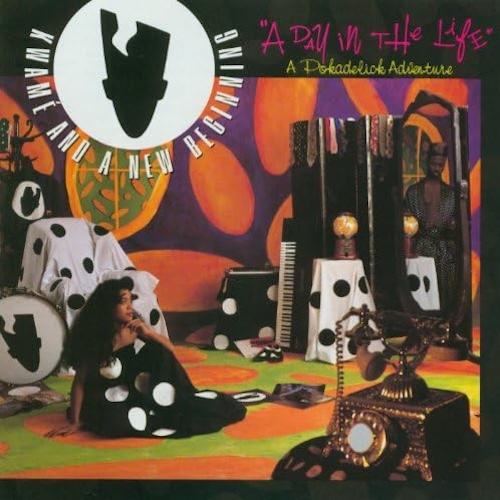Tell me if this line sounds familiar — “Your life is played out like Kwamé, and them fucking polka dots.” That’s right. The late Christopher Wallace said that in the first verse of the DJ Premier produced “Unbelievable.” For rap fans of that era Biggie Smalls accidentally defined Kwamé Holland as the wackest thing you could possibly be. Actually “accidentally” might be generous. His punchline was purposeful and had the carefree animosity of someone who was genuinely disgusted by commercial pop rap. “Punch” is also the operative word here as Kwamé and his “fucking polka dots” had been a joke to hardcore rap fans from almost the beginning. He was a punching bag for anybody looking for credibility. The easiest of easy targets. Low hanging fruit for the aspiring rappers of the world.
Was Kwamé really that bad though? I’m not here to tell you the polka dots weren’t silly, but in an era before the term even existed, Kwamé was “building his brand” with a unique visual aesthetic. So long as there was actual substance behind the branding there’s no reason to hate him for it, because you could just ignore it and enjoy the music on its own merits. “A Day in the Life: A Pokadelick Adventure” might be the ultimate example of not judging a book by its cover. Let’s take “Yes Yes Yall” for example. This is a classic 1989 example of a rapper dissing his competitors.
“See many emcees try to slap punch kick and box
But they all broke the fuck out like chickenpox
How dare you try to step to me sport?
… I can’t be caught”
I even hear a Bob James “Nautilus” sample in there and you know that gets a head nod from me. As someone who had been taught from a young age that Kwamé was a sucker emcee not worthy of respect, it was quite a pleasant surprise to hear him flip the script and talk shit. “Do you doubt my clout in the public eye? Hey boy I’ll eat you up like turkey on rye.” This is far fresher than I had been led to believe Kwamé was. It may not be the cutting edge of rap for the era, but it’s certainly not lagging far behind his competitors. If people hated the new jack swing of his single “Ownlee Eue” it’s hard to understand that. That was also part for the course in the era. Did you hate Heavy D or Wreckx-n-Effect for it too? If so you missed out on some fun music.
I think the biggest surprise here is that there are only two producers I can find credited — Kwamé himself and The Brothers Grimm — and what they put on this album is consistently solid. “I can get smooth off of this beat here” quips Kwamé on “Da’ Man” with the same energy you’d expect from a Slick Rick track a year earlier. In fact you could almost accuse him of biting Rick’s style here, including the singing between verses, but if you’re imitating someone great a little greatness can rub off on you in the process. It’s also amusing to me that Kwamé is a teenager at the time of recording this song yet he’s telling women they need to grow up and not act so foolish. He’s got big dad energy.
I have yet to see a copy of “A Day in the Life” with a parental advisory sticker on it. He’s not the type that throws around so many cuss words that it was an absolute necessity, but he’s also not as G rated as its absence would lead you to believe. On “Doin’ Ma Thang” he’s making it absolutely clear he’s “got the gangster style, I don’t wear sportswear” and he mocks a female who disses his bank account by saying her hair is “Leave It to Weaver.” That reference may be too old for today’s rap fans but that’s what hyperlinks are for right? Besides Kwamé sounds fly when he’s doing his own thing.
I’m having to try hard to find things to object to about this album. Maybe “Oneovdabigboiz” shows his youth a little, but Special Ed was the “Youngest In Charge” too. As much as a later generation of rappers relished using him as a target, it’s clear that even at the time of his success he had haters — and he just didn’t care about it that much. Sayeth Mr. Holland: “It’s cool! This life I enjoy, and I’m cool being Kwamé.” A little bit of self-confidence goes a long way in both life and the music business.
While I’d be overstating it to call “A Day in the Life” an undiscovered gem or a certified classic, I no longer think of him as a polka dot festooned joker like I used to. He may have slid to the commercial side of the rap spectrum, but in today’s era of rappers who are obsessed with materialism, gunplay and drug abuse, it’s not so bad to hear something a little more friendly for a change. If you’re weary of modern emcees Kwamé’s playful raps combined with swagger bigger than his age is a refreshing change of pace.

